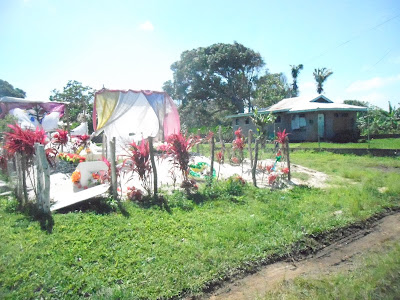Every culture honors its dead in unique ways. Tonga is no exception.
Tonga is an island formed by coral pushed up from the seabed. So when you dig, you don't have far to dig before you hit solid coral. As a result, most graves are created by creating frames for raised mounds.
Whether by forming a concrete frame or by laying blocks, graves are clearly defined by borders. And the grave markers you see are not what most people are used to: Here, where natural stone is incredibly expensive, families use fabric and wood.

The marker of choice is a quilt. It's far too warm, most of the year, to consider using a quilt on a bed, but somehow quilts have become quite popular as beautiful grave markers. This quilt takes the names of a husband and wife and frames them with depictions of the heilala flower, a tiny flower unique to Tonga. We have also seen graves lit at night by solar-powered lights, and even Christmas-style lights defining the border of a grave.
With no law to limit the location of graves, little cemeteries populate each village and indeed, many private homes, such as this one. This family couldn't afford a concrete or block frame for the grave, so they built a natural fence around it. The bushes provide color and some protection from the wind, and the posts and chicken wire keep out the animals.
Almost all graves are topped with sand. And what happens when the wind blows it away? We go get more. The Tongan government is beginning to get concerned about illegal "sand mining", the theft of sand by the truckload (!) from coastal beaches. This little island cannot afford to see its beaches eroded - we have few enough of them here to begin with.
Families who can afford it can bury their relatives in style - here is a concrete frame topped with ceramic tiling, blackstone rock, and permanently placed pots for silk flowers. This is one of the few polished granite markers I have seen on the island. But all graves are decorated with flowers, some with lace tablecloths, and some with hand-knitted afghans. The dead are protected in a place of beauty. There are a few LDS missionaries buried here, two who died in the Spanish flu outbreak in 1919 (the flu took two years to make it to Tonga, but it got here), and two others who died of other illnesses in the 1930s. Their graves are tended, too.
And again, if the family can afford it, the grave is protected from the elements by a pavilion roof. This will help the sand from being washed away in a sudden rain or a severe storm, and it will also keep the silk flowers from fading quickly in the hot sun.
And it provides shelter for mourners. When Tonga's king died last March, we got an extended view of the mourning traditions here in Tonga. Students tended small fires surrounding the palace all night long, the night before his body was brought to the royal tombs and the king's body was laid in its final resting place. So, too, is the tradition with all deaths. A round-the-clock vigil is kept at the gravesite for anywhere between 3 and 10 days, (noblemen sat under a pavilion roof all day and all night 100 days for the king)and gifts are offered to the family of the deceased, although in a totally different perspective, the family of the deceased feeds visiting relatives for many days after receiving the gifts.
















